
Skips Systems Software for Lottery, Lotto, Gambling, Powerball, Mega Millions, Euromillions
★ ★ ★ ★ ★
By Ion Saliu, Founder of: Lottery Programming Science, Gambling Mathematics



First capture by the WayBack Machine (web.archive.org) October 16, 2006.
The skip is at the heart of this system theory, more precisely the last one/two/three skips for each lotto / lottery game, roulette, horse race, NFL week. The skip is simply the number of drawings between two hits of a particular lottery number (digit). The skip is calculated here as number of drawings back. If, for example, a lotto number hit in the very last drawing and previously in drawing #3, then the skip is equal to 2: 3 - 1 = 2. We can say that the lotto number hit last time 2 draws back. You can also think the skip as the gap between two hits, or as hit-and-miss count.
This method of calculating the skip is slightly different from the method applied in MDIEditor Lotto WE and in the LotWon lottery software (the Command Prompt software; e.g. Bright6). In LotWon, the skip is calculated as the absolute number of draws skipped between hits. In the example above, the skip is 1. The LotWon skip is always less 1 than the skip calculated by SkipsSystem.
The difference is well thought out. The skip in LotWon acts as a lottery filter. In Skip System, the skip represents a probability parameter calculated by the Fundamental Formula of Gambling (FFG).

Once upon a time, I created a special lotto system for Powerball, by running software to generate skips and automatically generate systems based on skips below the FFG median. I wrote on that Web page:
Skip System handles the following lotto and lottery games: 3-, 4-, 5-digit (Quinto) pick lotteries; 4-, 5-, 6-, 7-number lotto jackpot games; Powerball, Mega Millions (5+1), and Euromillions (5&2). It also works with trifectas in horse racing; also roulette, and NFL football parlays.
Here is the main screen of the comprehensive program (12 modules):
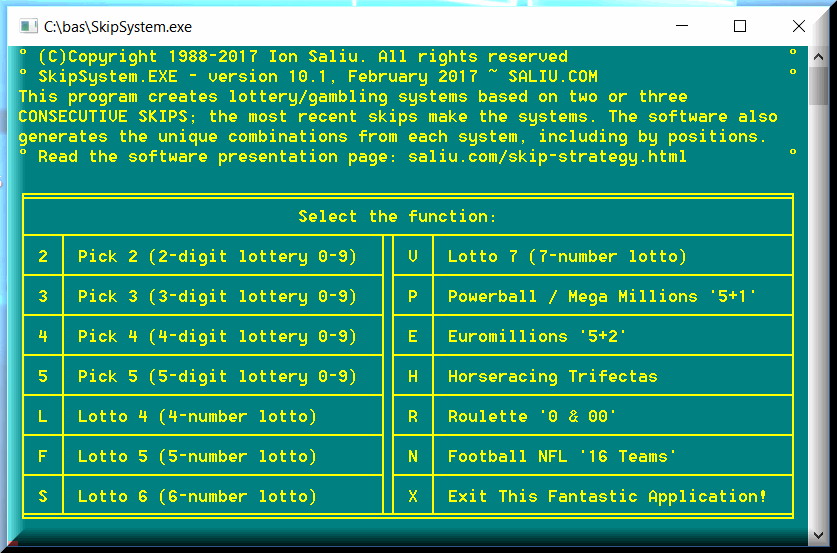
In turn, every module has two main functions:
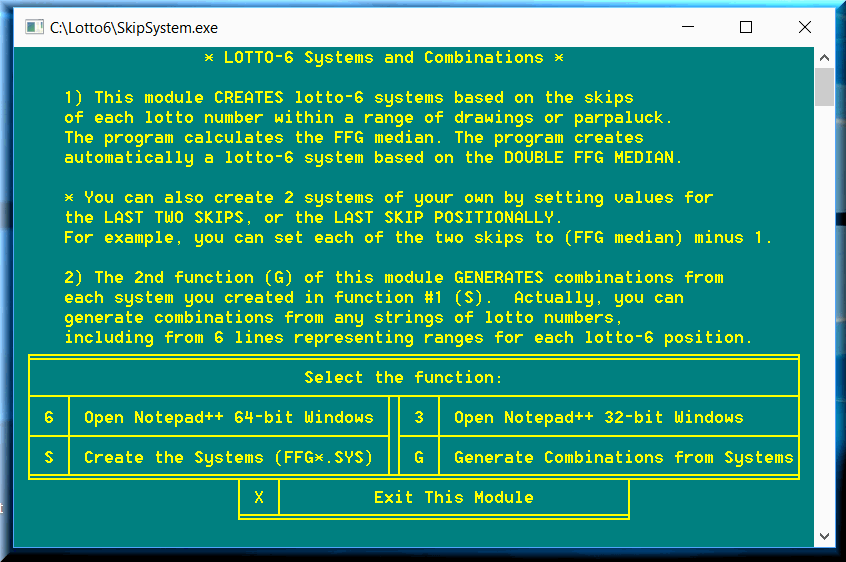
For increased functionality, SkipSystem employs the services of an excellent text editor: Notepad++. It is freeware from here:
I made sure Notepad++ runs under both 32-bit and 64-bit Windows. These are the program locations (where it should be installed):
C:\Program Files\Notepad++\notepad++ (32-bit);
C:\Program Files (x86)\Notepad++\notepad++ (64-bit).

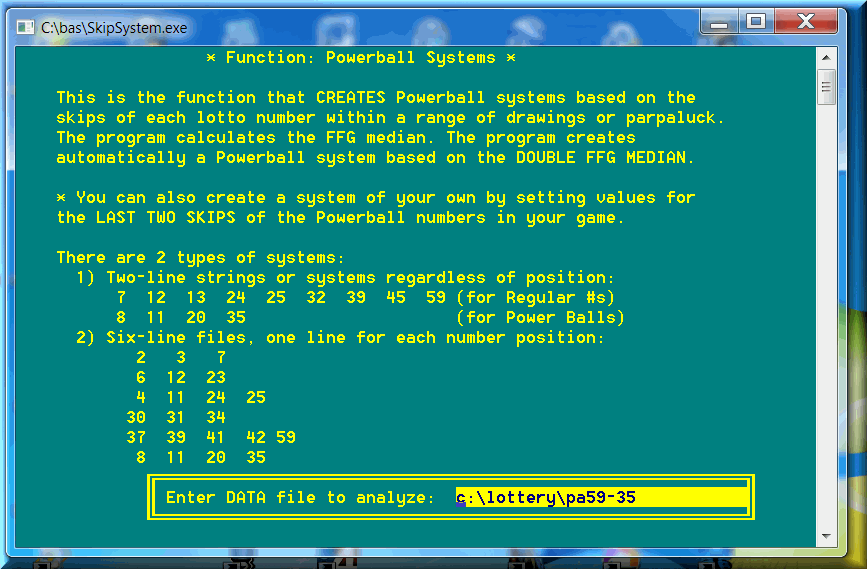
These are the first two values of the skip report that starts every lotto, lottery numbers. For example:
Number: 4
Any Position: 3 5 17 3 7 7 10 5 3 11 1 6 6 = the skips
The first two entries are 3 and 5. Those are the most recent skips for lotto number 4.
The main lottery strategy page starts with the simplest of lotto systems based on skips and pools (groups) of numbers. There are also other systems out there (very expensive, though, such as Gail Howard's) based on the first skip or the two most recent skips of each lotto number. For example, you might have read recommendations of this nature. “Select lotto numbers that hit within the last five or so drawings and also hit in the last 10 draws or so.” In this case, you would select lotto numbers with the first two skips in the form: 3, 5; or 4, 5; or 2, 1; or 4, 3; or 5, 5.
Well, such a lotto strategy is not standing on strong mathematical grounds. It doesn't explain why the magical numbers 5 and 10?
That's where the Fundamental Formula of Gambling (FFG) steps in. The FFG has discovered that each and every lotto number repeats, in 50%+ of all its hit situations, after a number of draws equal to the FFG median.
I went one step further. It is one of my discoveries in casino gambling. I look at the first two skips (the two most recent skips). Instead of selecting lottery numbers that show each of the two most recent skips less than or equal to the FFG median, I SUM UP the skips. In the previous example, lotto #4 started with the skips 3 and 5. Each skip is under FFG median. One possible lottery system will select #4 as being playable. The lotto #4 is also playable because 3+5=8; the result is less than the double amount of the FFG median. Double FFG median is equal to 12 for the lotto 6/49 game.
The lottery system based on the double FFG median is clearly more frequent than a system based on each of the two skips being under the FFG median. In the example above:
Lotto Number: 4
Any Position: 3 5 17 3 7 7 10 5 3 11 1 6 6
* Automatic System = Double FFG Median of 12: 5 times in 13 hits (38%)
* Your System Hits <= 6 6: 3 times in 13 hits (23%)
<= 6 6: describes a system where the user sets the first skip to less than or equal to 6 (FFG median), and the second skip at the same level.
Lotto Number: 9
Any Position: 4 7 3 3 4 6 3 2 21 2 2 5 7 1 11 15
* Automatic System = Double FFG Median of 12: 12 times in 16 hits (75%)
* Your System Hits = 6 6: 7 times in 16 hits (44%)
The Automatic System is exactly what it says. The program selects the lottery numbers for which the first two skips sum up to Double FFG Median (12 in this real 6/9 lotto case).
The so-called Your System will be your own creation. You create your own lottery system based on the first two skips (the two most recent).
The Automatic System recorded 12 hits (winning situations) or 75% of cases for lotto #9. The Your System (mine, in this case) registered 7 hits (winning situations) or 44% of cases for lotto #9.
Hint: Numbers where the Automatic System registers 50% or better hits represent the golden eggs!
You can set Your System to any values you want to. The two skip values do not need to be equal. If you select values above the FFG median, your lottery system will record more hits. For example, values such as 8 and 7, instead of 6 and 6.
The lottery software defaults to the FFG median. You don't have to fire up SuperFormula and calculate the FFG median or the degree of certainty.

The perfect generating procedures are now components of Skip System. The software generates now correct and unique combinations, including from skip positional systems. The latter are strictly positional combinations. That is, a number in line #4 of the system will never appear also in line #2 (as an example). The positional combinations are also sorted in ascending order vertically (i.e. sorting by column).
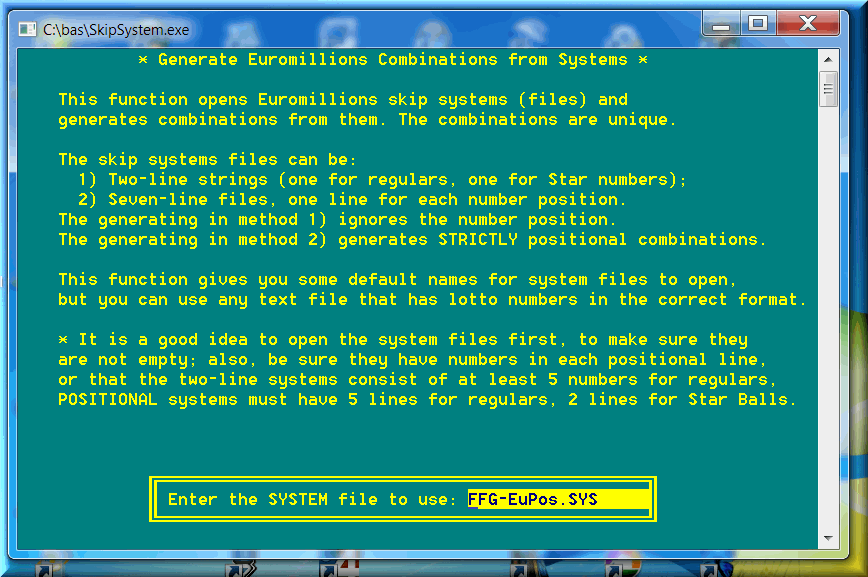
Axiomatic one, here is a real-life example in the 6-49 lotto game in Pennsylvania. The following is the positional skip system, with exactly 6 lines, one for each number position; no line is empty (otherwise the strategy would not generate a single combination):
2 3 5 7 9
3 5 11 13 16 17 31
4 6 7 15 18 39
6 7 25 26 30 33 40 41
26 27 33 36 38 45 46
26 28 37 38 44 47 48 49
You can notice some numbers are common. Also, numbers in higher ranked lines are lower than numbers in previous lines; e.g. 7 in line #4 is lower than 4 in line #3. The generating function in this software will take good care of such occurrences. All combinations generated will be unique and in the correct combination format (the 6 numbers sorted in ascending order, as the combination format requires).
Total combinations generated from the positional skip system: 5461. If the numbers in the system are all-unique and in according order from line to line, the system would generate 5 * 7 * 6 * 8 * 7 * 8 = 94,080 combinations. The lotto strategy based on positional skips has a higher efficiency. The unique combinations go from the lowest indexes (lexicographic order) to the highest:
2 3 4 6 26 28
2 3 4 6 26 37
2 3 4 6 26 38
2 3 4 6 26 44
2 3 4 6 26 47
...
9 31 39 40 46 48
9 31 39 40 46 49
9 31 39 41 45 47
9 31 39 41 45 48
9 31 39 41 45 49
...

I have not checked what happens from drawing to drawing. I have not written the lottery software to automate the process of checking for winners. If you are the patient type - you might want to try it manually! Go back 100 draws in your lottery data file and check the next drawings one at a time.
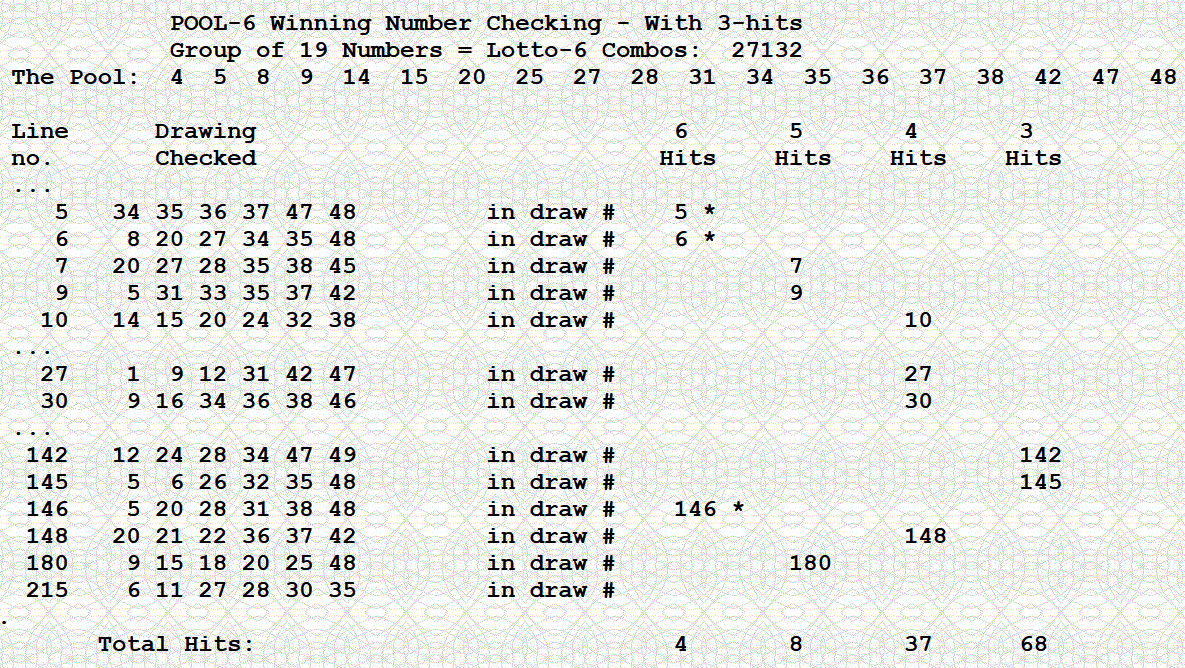
The results were poor at the beginning of the lotto game. It takes a while for a group of lotto numbers to take over for a range of drawings. At a different point in the lottery drawings file, other numbers will take over. The jackpot situations reflect lotto numbers with good recent frequency and higher percentages of the hit situations for the lottery system.
Version 1.0 of SkipSystem calculated the probability of pick-3 lottery for any position as 3/10. The precise method is p = 271/1000. The necessary corrections were made also to the pick-4 lottery and horse racing. The double FFG medians for pick-4 and horse racing were also increased by 1 for more accurate results.

There are many lottery combinations to play by using the skip systems created here. That's mathematics. Some lottery players might get disappointed with the truth.
The raw output file generated by a skip lottery system contains many unnecessary combinations. For example, it is very unlikely that all skips will be equal to 1; or all equal to 2; or the skip string will be 1 1 1 2 2 2; or the skips will be 1 2 3 4 5 6 or 6 5 4 3 2 1; etc. You get the point. The combosnations (a favorite lotto-speak term of mine!) generated by such skip configurations represent wasted tickets.
Be mindful that the lottery is based on gigantic odds. Many more filters are necessary to reduce the amount of lotto combinations to a playable size. I created my lotto, lottery software with that goal in mind. I came up with powerful reduction tools such the lottery filters. Use other lottery apps in my software packages in conjunction with SkipSystems.
The Your System option allows you to create your own lottery skip systems; e.g. systems with a higher frequency. Instead of skips under FFG median, try skips for degree of certainty DC equal to 75%. It amounts to N = 11 (or 10 in SkipDecaFreq). You accomplish the task in the Your System option. Only SKIP #1 matters here. Set it to 10. For SKIP #2, type a very large number; e.g. 1000. I don't think a lotto number will ever skip 1000 lottery drawings... not even close! That way, we will disregard the second skip of every lotto number.
Next, run the Check Strategy option in SkipDecaFreq. Lotto strategy: the MAXimum level of all 6 skips equal to or under 10 (all skips up to 10; i.e. in single digits).
The particular 6/49 lotto strategy has a very good frequency: 135 – 180 hits in 1000 drawings (13 – 18 times in 100 draws, or one year). The median of the strategy is 5. That is, in over 50% of the hits, the strategy comes to life after 0 drawings (consecutive hits) or after up to 5 draws. If you wait from 0 to 7 draws, the frequency is significantly higher. Meanwhile, none of 1000 lottery drawings analyzed had all skips in double digits. See the real-life statistical report: Report: Lottery Skips Systems, Best Chance at Lotto Jackpot.
It is very rare that 4 of the 6 numbers in any skip system have the same skip value. Therefore, we can apply the filters in the W6.1 reports to the L = Lexicographic Combinations option of Bright / Ultimate Software (main menu). The Four filter is over 1000 in 50 of the 1000 drawings analyzed. It eliminates all 4-number groups that appeared in the last 1000 lottery draws. The big Del6 filter is also very potent. It reaches over 1000000 (one million) numerous times. It is slow, however, as the Deltas-6 filter is very processor-intensive.
The procedure above is known as Purge in my lottery software. In addition, there is the other powerful feature: LIE Elimination strategy. Here is one example of a good candidate for the LIE Elimination function: Top half / Bottom half of the lotto numbers sorted by frequency. The Top 25 or Hot 25 lottery numbers rarely will register 5 winners if applied from draw to draw. Therefore we can safely apply the ID5 filter in the LIE Elimination function. The Bottom 25 or Cold 25 numbers rarely will register 4 winners if applied from draw to draw. Therefore we can safely apply the ID4 filter in the LIE Elimination function. Each ID filter will safely eliminate a very large amount of combinations from the respective skip system (FFG*.SYS). Good riddance!
All these procedures in synergy can thin a skip system to very few combinations to play (translated into tickets).
In conclusion: We need to keep in mind that every lottery skip system consists largely of unwanted combinations. We need to discard of them by applying the Purge and LIE Elimination functions proprietary to the Parpaluck software (Ion Saliu's royalty name; every human has a right to a royalty-name and should boast one in all places and times in life).

Power comes at a price: Complexity. You might think other lottery system developers give you easier choices. You falsely believe that they make your life easier, compared to my software and theories. The other guys only get you drunk with illusions. They make you think you can avoid mathematics all together! It's an illusion. They also give you the illusion of winning with 10-20 lotto combinations! They simply give you 10-20 random lotto combinations, without any real data processing. They only lie to you!
The main lottery, lotto strategy software page makes a truthful assessment of my lotto, lottery theories and software, and all the other theories and programs out there. It is as honest as it can be: It's mathematical!
The skip systems are ideal for roulette or other casino games where the skips can be tracked. In turn, these games have their own drawback: The players are not allowed to use computers inside casinos. The skip gambling systems for roulette or craps can be plotted manually, on paper only. For example, play only the numbers (outcomes) that show 2 (or even 3) consecutive skips under median.
Here is data from the Hamburg Casino (Spielbank), Germany, showing clearly a better performance by the under median roulette strategies.
FFG-1: 2 skips SUM-UP TO 52 = 2823 hits in 7000 (40%) = 16 numbers (to play)
FFG-2: 2 skips UNDER/EQUAL 26 = 1806 hits in 7000 (26%) = 12 numbers
FFG-3: 2 skips ABOVE 26 = 1681 hits in 7000 (24%) = 11 numbers
FFG-4: 3 skips UNDER/EQUAL 26 = 927 hits in 7000 (13%) = 7 numbers
FFG-5: 3 skips ABOVE 26 = 859 hits in 7000 (12%) = 8 numbers
FFG-6: MEDIAN & SUM <= 52 = 2309 hits in 7000 (33%) = 11 numbers
FFG-7: 1st Skip <= 26 = 3505 hits in 7000 (50%) = 17 numbers
FFG-8: 1st Skip > 26 = 3384 hits in 7000 (48%) = 20 numbers
SYS-: Your System <= 20 20 = 1244 hits in 7000 (18%) = 7 numbers
Read a beginning of my theory of skips in gambling and lottery here (a repost from my closed forums):


Home | Search | New Writings | Fundamental Formula | Odds, Generator | Contents | Forums | Sitemap
